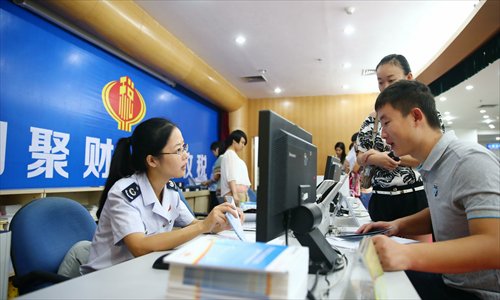HOME >> BUSINESS
MOF cracks down on preferential taxes
By Hu Weijia Source:Global Times Published: 2014-12-24 23:28:01
Local govts ordered to tighten up on benefits

A taxpayer consults with a tax official in Haikou, South China's Hainan Province. Photo: IC
The Ministry of Finance (MOF) on Wednesday said it had prohibited local governments from rolling out new preferential tax policies for enterprises, with the rule having taken effect on Monday.
Local governments will not be allowed to issue new preferential tax measures or lower administrative fees imposed by government departments, unless specifically allowed to do so, the MOF said in a statement posted on its website Wednesday.
The MOF's move came after a statement issued by the State Council on December 1, which ordered related authorities and local governments to regulate preferential tax policies.
Illegal preferential taxes promised by local governments are currently being investigated by the MOF and they must be abolished as the State Council required, the statement said.
Legal preferential taxes can be maintained for a certain period after they get approved by the State Council, the statement said.
Local governments were also ordered to report any new adjustment of their preferential tax policies on their websites, it said.
"The most important aspect of the new rules is to break local protectionism and build a more orderly and open market," Jiang Zhen, a research fellow with the National Academy of Economic Strategy under the Chinese Academy of Social Sciences, told the Global Times on Wednesday.
In recent decades, local governments have competed to attract capital and investment, and finding ways to encourage firms to operate locally can generate tax revenues and GDP growth.
So local governments have offered preferential taxes and subsidies, even though this can obstruct free competition between regional markets, Jiang said, adding that it can also impair macro controls.
"Under the new rules, preferential measures launched by local governments are expected to be more tightly controlled in the coming months," Cui Jun, a professor at Renmin University of China, told the Global Times on Wednesday.
Preferential policies including tax refunds and financial subsidies in some non-national level special economic zones across the country may also be adjusted, Jiang said.
The statement said any form of preferential tax policy that does not have approval from the State Council would be banned, but it didn't mention any specific measures involved.
The rules will have a big impact on most local governments and a large amount of enterprises, but they will not significantly increase the tax burden for companies as they will be accompanied by other tax reforms, Jiang said.
Forbidding local governments from launching preferential tax policies is an important part of the reform of China's taxation system, which will involve huge structural readjustment that will reduce companies' tax burden, Cui said.
For instance, China's value-added tax (VAT) reform resulted in a tax reduction of 267.9 billion yuan ($43.56 billion) for businesses by the end of July, according to data from the State Administration of Taxation.
But implementation of the rules will not be easy as it will require local governments to change their approach to stimulating GDP growth and offering public services, Jiang said.
A notice published by the State Council on December 9 set the end of March 2015 as the deadline for local governments to hand in detailed reports on their progress in trimming preferential tax measures.
Posted in: Economy